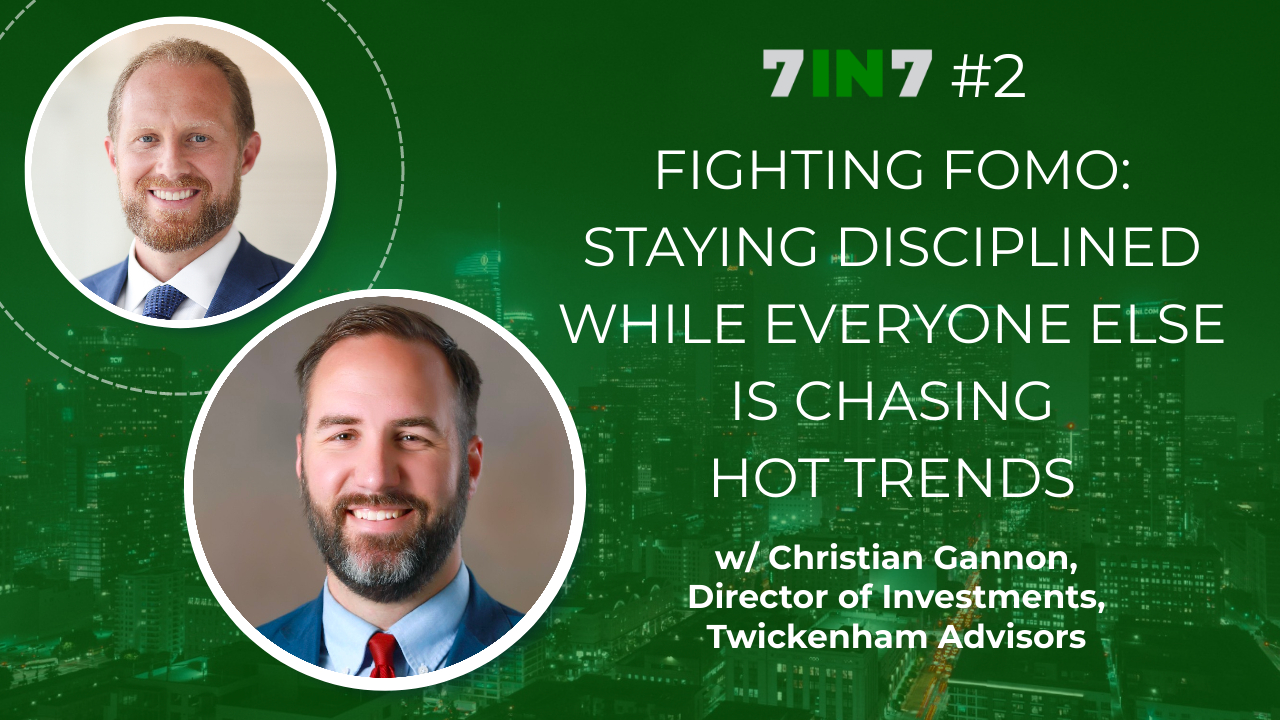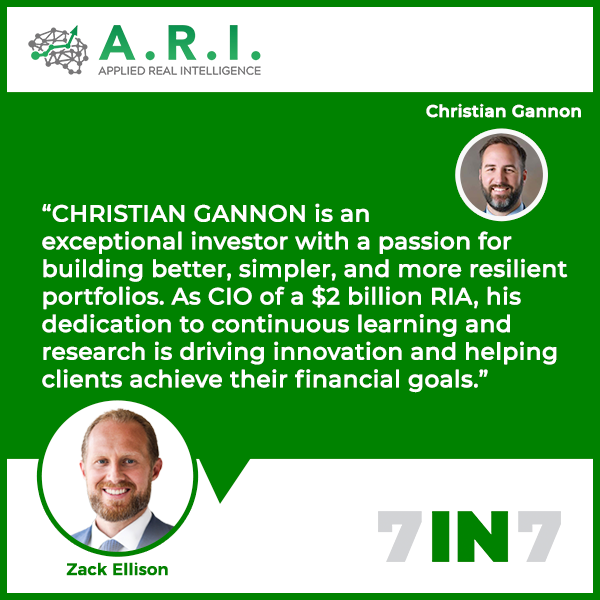
 |
 |
 |
|---|
Watch the episode here
Listen to the podcast here
Christian Gannon, Director of Investments at Twickenham Advisors, helps advisors navigate FOMO (Fear of Missing Out) by crafting tailored investment solutions that keep clients focused on long-term goals. In this episode, Zack and Christian discuss:
- Mistakes Make Us Better Investors
- Investing in Times of Economic Uncertainty
- How to Stay Ahead of the Game in a Rapidly Changing Market
- Just Buy Good Businesses – The Unsexy Secret to Investment Success
- The Misconception of Debt-like Returns in Venture Capital Risk
Fighting FOMO: Staying Disciplined While Everyone Else Is Chasing Hot Trends With Christian Gannon, Director Of Investments, Twickenham Advisors
With me is my good friend and leading investor, Christian Gannon. Christian, you’re one of the best investors I know and also my classmate at University of Florida in the doctoral program in business administration. I’m excited to have you. We’re just going to focus on your best piece of investment advice and understanding what got you here. Let’s start with a little bit on your background and how you got to where you are in the investment industry.
Thanks, Zack. That’s very kind. I got into the investment industry a little over a decade ago, close to 15 years now. I got into the finance industry just because I wanted to help people. As I got in, I found that the investment side was interesting. I think there’s always something to learn with investment management to a 40,000 piece puzzle that you’re looking for the right 15 to 20 pieces to put together for a client. There’s no right or wrong way to do it necessarily and the puzzle is never complete. It’s always a new challenge. I’ve had the luxury of working for large organizations and small organizations. I started out on the client side, and then I worked for an alternative investment firm doing manager research and building hedge fund and private equity portfolios. I built models for a bank wealth management platform and now in CIO for a $2 billion RIA in Huntsville, Alabama.
Tell us a little bit about your current role and what you’re focused on now.
As I said, I want to help people and I love the research side. My passion is finding ways to build better portfolios for clients. Every day, there’s new things coming out of the industry. There’s always something new to learn about and consider. For a lot of people, that’s overwhelming. I’m passionate about learning and diving into these new things, so finding ways to build better portfolios. There’s a couple of key things that I’m focused on. 1) Simplicity. 2) Resilience.

We, as an industry, build complex things and there’s a lot of different reasons for that. What I want to do is find ways to bring simplicity back into portfolio construction while not sacrificing the resilience that we can get from having interesting investment strategies included. The second thing I would say is, first of all, I knew you’d talked about pursuing my doctorate. I want to use the research skills that we develop from that more academic environment to help the entire investment industry get better at what we do. We have such an important role that we play in the economy. Everybody has money. Everybody’s investing and so I want to help find ways to contribute to the growing collective knowledge that we have as an industry.
I want to start the seven key questions and we’re going to get into the meat of it. The first question is, when you think about investors you admire that you’ve learned from, what are the characteristics that they share? How do you utilize those in your own work?
Key Characteristics Of Successful Investors
Desire to learn is a crucial component. The other three things that I would highlight are conviction, calmness, and humility. The investors that I admire are comfortable regardless of circumstance because they put the work in on the front end to think about the strategy that they’re trying to execute. What that does is it helps you when you go through periods of stress and periods of exuberance. You’re able to not get too high or too low. Those people that I’ve had the pleasure of working with, that’s been one key thing. The other thing and, it lacks seriously across our industry, is humility. There’s this fine balance between confidence and hubris. We want to be confident in the decisions that we make. What I found is that good investors are willing to challenge their own assumptions and to learn from their mistakes.
Good investors are willing to challenge their own assumptions and learn from their mistakes. Share on XThe first part of that is identifying mistakes and being willing to admit that, “We made a mistake,” and now we can grow from it. I always tell all my analysts it’s okay to make mistakes. Nobody bats a thousand. What we want to do is try and learn from those mistakes. Those are the things. I think desire to learn, conviction, calmness, and humility are some of the big characteristics that I tried to exude for my clients day in and day out.
Those are great characteristics. One, I’ll add to that is being innovative and open-minded. I know you’re very innovative and have spent a lot of time in the alternative investment space which ultimately is where most of the innovation is occurring. With that, what’s something that you’re thinking about in the investing space that you think most people are not thinking about that’s important?
The Distinction Between The Market And The Economy
The biggest thing and it’s probably common and in any period of stress like this. The economy is not the market and the market is not the economy. Too many people conflate the investment market with the economy. That’s why you see Warren Buffett’s advice, “To be greedy when others are fearful and vice versa.” It makes sense because most people, when we go through periods like this, they think, “This is the worst time to put my money to work. Everything is so bad.”
The economy is not the market, and the market is not the economy. Share on XWe think linearly as humans. We just picture these trends continuing into perpetuity. The reality is, the economy is a present indicator. Investing is for the future. What we need to think about is how the present affects the future but we want to look forward as we’re putting money to work and do we think that we’re going to be better off 5 or 10 years from now? Even after a 20% sell-off like we had in 2022. Most people, if they’ve been invested for the last 10 or 15 years, are better off than they were 10 or 15 years ago. It’s one of those things that people get caught up in the moment. What we have to do as investors is to look forward and that’s where being innovative, being creative, and thinking outside of the box is a valuable tool as an investor.
You have some interesting points there and I agree that a lot of folks are very backward looking. So when there is dislocation in the markets that create opportunity, they often miss those because they’re thinking about what happened in the past and they’re not thinking about what’s coming up next. Nobody will admit that to you. They don’t even admit it to themselves. They’re unaware of that bias. There’s a lot of that anchoring to what’s happening in the past. Very few people are able and willing to innovate and seize the opportunities. In hindsight, they always look back and kick themselves. If you can go back to 2010 and invest in private credit, for instance, you would do so. But at the time, nobody wanted to do it because they were all scared. We’ve got some interesting opportunities that we’ll talk about within venture debt, for instance, with the failure of Silicon Valley Bank. Some people will seize that but a lot of people miss it and look back in a decade and say, “How did I miss that? It was so obvious in hindsight.” When you’re in the midst of turmoil, it’s hard to think clearly. Let’s talk about the investment principles that you live by. You talked about the characteristics you admire and some of the top investors. Are there certain specific investment principles that you think every investor should be thinking about that you utilize in all of your portfolio construction?
Investment Principles: Buying Good Businesses And Risk Intelligence
It’s simple advice from Warren Buffett and many other great investors is, buy good businesses. It is not sexy but it works. It becomes challenging in periods like the last ten years because by good compounding businesses, you have a good long-term thesis for that. You have strong market positions. They’re often not the ones that are at the top or the bottom of the heap in any given year. It’s challenging. You can get FOMO and you see people making a bunch of money in these other areas and it’s like, “I need to start chasing some of those things.” Finding good businesses too to invest in.
Buy good businesses. It’s not sexy but it works. Share on XPatience as an investor’s greatest asset. I tell people all the time, it’s not about finding that magic bullet that’s going to get you 10,000% in the couple of years. It’s about being consistent and disciplined in having a plan putting that to work day after day. The other thing I would say is that I have a good friend of mine that I used to work for, Tom Rigert. He always told me to be skeptical in the research. When somebody comes to me with something and it sounds too good to be true, it probably is. We want to start at a point of no and try to find any reason not to invest. If we get to a point where we’re comfortable and our reservations have been taken away, it may be a good investment. Too many people are afraid to ask questions in the process and try to understand what somebody is bringing to you. Some pitches sound too good to be true and what we’ve learned from the past is, chances are if it looks too good to be true, it probably is.
Chris, you nailed it. To summarize, good businesses, patience as an investor, being very disciplined and being skeptical and what I would think of as being risk intelligent and thinking about the downside. Not just caught up in the upside. One thing, I’ll add to that we’ve talked about offline is price versus value as well. You want to make sure you’re buying companies or investing at the right price. Sometimes, there’s assets that might not be attractive in terms of some of the characteristics but they might be priced in such a way that they still offer a substantial upside. That’s ultimately what some value investors look at like Warren Buffett. Buying businesses that maybe aren’t always what we call great businesses, but you’re buying it at such an advantageous price that you’ve got a lot of upside there. What I think a lot of is price versus value. I’ve noticed there’s a lot of folks that don’t talk about one of those two in the context of the conversation. They’re missing it and saying, “This is a great company.” My thought is, “Where’s it priced?” They’ll say, “This is a risky asset.” Where is it priced? Without the price being mentioned in the context of the conversation, you are missing the key component. With that, I want to move on to talking about alternative investments, an area where you’ve got a ton of experience and expertise. Quite frankly, I think you’re a forward thinker in the area. A lot of folks are still very conservative and anchored to stocks and bonds. They’re missing these huge opportunities and alternatives, whether that’s real estate or private equity, private credit, venture capital or commodities. Very quickly, what do you think is most attractive about alternatives broadly? Why should they be included in most investors portfolios?
Alternative Investments Opportunities
I’ll separate two things. When we think about private equity, private debt or private real estate, we’ve seen a trend over the last two decades toward companies staying private longer and a lot more things happening in the private markets than in the public market. Public markets have traded from 8,000 stocks many years ago. Now, we have about 3,500 stocks in the US. There’s a much broader universe of opportunity that’s available out there to investors.

FOMO: There are currently about 350,000 stocks in the US, offering a much broader universe of opportunities for investors.
The more that we see that trend continue, it broadens the opportunity set, the ability to go out and find opportunities where you can be patient and where you can find idiosyncratic opportunities to invest in good businesses that are not available on the public market. Whether that’s through equity debt or real assets. Private strategies help in ribbiting a lot of the behavioral issues that investors have. Investors are naturally short term like we’ve talked about. Some of the limited marks that we get and there’s some research coming out on that is more of a feature than a bug for a lot of these strategies. It allows investors to think longer term. It allows good investment managers to create and unlock value by not thinking about what’s this going to look like on next quarter’s earnings statement but what’s this going to look like over the next 10 years. That’s a much more attractive proposition. One that gives you a lot more control as an investor. It’s an attractive characteristic of these types of investments.
Within the alt space, there’s a lot of focus on identifying unique and differentiated strategies. Oftentimes, those are coming from emerging managers that have started new strategies that others have not yet gotten involved with. In broad strokes, what are some advantages of investing in emerging managers?
The research shows that managers generate the most alpha when funds are small and in earlier stages of the life cycle. One of the big things that I think about as an allocator is alignment of interests between me and my investors and the investment manager. There’s strong alignment of interest in those early stages because emerging managers have it generally generated. They’re not multibillionaire or private equity managers at that point. All of their capital is tied up into making this one thing work. There’s a strong alignment of interests there which is attractive. The one big thing, inefficiency drives the ability to generate returns and inefficiency is so much more prevalent at smaller investment sizes. We think about even in more mature investment managers, those that grow their funds you start to see this leveling off of the value they’re adding. It’s not the same as they had it at early stages. Having the ability to be selective in where you’re putting capital versus trying to buckshot all across the market and buy everything you can because you’ve got to allocate this capital. Being able to look at 100 investment decisions and pick two of them that you like. Pick your two favorite ones. That’s an attractive trade-off to me. For emerging managers, you have a much greater ability and need to do that than as you grow and become more mature. It’s like we talked about in the advisory business. Most of the clients when they come to us have already made their wealth. You make your wealth using idiosyncratic risk, concentrating your exposure into a single investment or a small number of investments. You maintain your wealth by diversifying across lots of different investments. You see that trend in larger private equity or private debt. Larger investment firms in general are that you’ve made it and now you don’t have to take as much risk to get there. It is as when you’re an emerging manager and you’re thinking about, how am I going to build this and grow this? How am I going to get this to fund 2, fund 3 and fund 4? A big part of that is going to be performance in the early stages.
You make your wealth by diversifying across many different investments. Share on XGreat points and a lot of people I think overlook. I’ve got two more questions and one dovetails into what you were just talking about. The question is, with an emerging strategy like venture debt, there’s now a huge catalyst in the market for strong performance given that Silicon Valley Bank and other lenders that were prominent in the space have now collapsed and are out of the market. What is it that you see in terms of venture debt and private credit that you think is attractive in this next part of the cycle?
Venture Debt And Private Credit Opportunities
The opportunity set is very large and there are more people that are seeking more opportunities to go out and find funding outside of traditional banks that may be more advantageous. Venture debt specifically is interesting. One of the things that I’ve reviewed over the last couple of years is low LTVs with high yields. For a lot of people, a lot of the misconception is you get debt-like returns with venture capital risk and I don’t think that’s true. The LTVs on most of the venture debt deals that I have looked at are so low. There’s a lot of protection there for the credit investor that if there is a default, there’s the ability to come in and plenty of coverage to be able to cover the amount that’s being led there. That’s interesting. The other thing is there is this incentive for the company. The company wants to hold on to as much equity as they can. If you’re at an early-stage venture company, you think this is going to be something much bigger. You want to hold on to as much as you can in the early stages. It creates this strong incentive that you’re trying to hold on and grow this. It’s a very interesting payoff that is a good trend for the industry as a whole that we keep more of that equity ownership in the entrepreneur’s hands versus passing it off to private equity firms and things like that. In a lot of the private credit space, you see a lot of seniors secured lending at things like that. There’s lots of different ways to create asset back structures, and securitized different things and for managers to have more ability to have control about the risk that they’re taking. That, to me as an investor, when I’m working with somebody that has to be able to control what covenants you’re getting, and how you’re being protected. That’s attractive to me relative to the more traditional fixed income markets.

FOMO: There are many different ways to create asset-backed structures and securitize various assets, allowing managers greater control over the risks they are taking.
You nailed it in terms of the ability to control the structure. It’s a huge de-risking mechanism in general for private credit. You can take a good company and then you put a tight deal structure around it. It de-risks it further. We’re going to have one bonus question, but the last of the seven questions is what are the key investment themes that you see for the next couple of years in your mind? The top two or three.
Key Investment Themes For The Coming Years
The first one as we come out of a zero-interest rate environment where we’ve had massive growth, accommodative, expansionary, monetary, and fiscal policies coming out of 2008. I think that what you see is we are in a higher interest rate environment than we’ve been in the past years. Inflation is probably going to be higher over the next few years than it has been over the past years. To me, a return to the importance of cashflows as a metric in thinking about companies moving away from where we’ve been in an environment that’s been driven by multiple expansion and using leverage to create value. That’s going to be a much more challenging theme to carry on over the next 5 to 10 years. Cashflow becomes a much more important consideration for investors. The other thing and it goes back to what we’ve already talked about. Private markets offer an attractive opportunity and we’re going to see a continued growth in the strategies being offered and continued innovation in the way that we get that into more client’s portfolios. The other thing is it will be interesting to see coming out of getting into an environment. The 60/40 portfolio tends to work well in disinflationary growth environments. There’s a chart from a group called ReSolve Asset Management. They show the real returns of a 60/40 portfolio and what you see is disinflationary growth environments tend to be good for which we’ve had the last over the years. Over the next 10 to 20 years, there’s going to be more demand for alternative assets that can help to bolster that 60/40 portfolio. It’s going to be challenging to see the type of growth that we’ve seen in the 60/40 over the past years and over the next ten years. There’s going to be this demand and hunger for some altar of assets to bolster portfolios.
Considering the growth we've witnessed over the past 20 years, it is reasonable to expect a similar trajectory over the next 10 years. This growth will likely lead to an increased demand for alternative assets to diversify and bolster investment… Share on XI couldn’t agree more. I also think this is where the world’s headed. I’ve got my Florida Gators hat on now for the bonus question which is why does the University of Florida have the best doctorate in business administration program in the country in your view?
If Phil reads this, then that’s great, Phil. Pay me a tip. The rigor of the research methods and courses that we’ve taken and Phil’s focus on that as a key driver of the process. It’s such a huge differentiator. Having the level of faculty that we have and the resources that we have, what a value add. I didn’t realize how hard conducting good rigorous academic research and making sure that you’re testing the things that you want to test. That’s me having somebody like Dr. Podsakoff who’s been cited thousands of times on methods and leading you in that process is a huge value add.
I agree. My favorite part of the program is the professors and our classmates and the gear, of course. I’ve got more gator hoodies than probably anybody in Los Angeles. The blue and orange looks great. Christian, thanks so much for coming on. I appreciate your views. Thanks everybody for reading and see you in the next episode.
Important Links
- Zack Ellison on LinkedIn
- Applied Real Intelligence (A.R.I.)
- 7 in 7 Show with Zack Ellison on Apple
- 7 in 7 Show with Zack Ellison on Spotify
- 7 in 7 Show with Zack Ellison on YouTube
- 7 in 7 Show with Zack Ellison on Amazon Music
- Christian Gannon on LinkedIn
- Twickenham Advisors
- Twickenham Advisors on LinkedIn
- Twickenham Advisors Year-in-Review 2022
- ReSolve Asset Management
- 7 in 7 Show Disclaimer
About Christian Gannon
 I am a senior investment and research professional with 10+ years of portfolio management experience with AUM up to $11B+. I construct and optimize multi-asset class portfolios; sourcing, selecting, and monitoring managers across dozens of asset classes. I am an expert in the manager search and selection process, through deep and thorough due diligence (quantitative and qualitative), conducting over 1,000 due diligence meetings in the last decade. I am skilled in accurately assessing and developing expectations for future manager performance. I am an avid hunter of unique and creative investment solutions to build resilient investment portfolios. I demonstrate success in analyzing portfolios to revise and enhance strategies to achieve clients’ ultimate goals. I am a collaborative leader who sets a collegial example in relating to senior leaders as well as analysts. Lastly, I possess a growing interest in philanthropic pursuits.
I am a senior investment and research professional with 10+ years of portfolio management experience with AUM up to $11B+. I construct and optimize multi-asset class portfolios; sourcing, selecting, and monitoring managers across dozens of asset classes. I am an expert in the manager search and selection process, through deep and thorough due diligence (quantitative and qualitative), conducting over 1,000 due diligence meetings in the last decade. I am skilled in accurately assessing and developing expectations for future manager performance. I am an avid hunter of unique and creative investment solutions to build resilient investment portfolios. I demonstrate success in analyzing portfolios to revise and enhance strategies to achieve clients’ ultimate goals. I am a collaborative leader who sets a collegial example in relating to senior leaders as well as analysts. Lastly, I possess a growing interest in philanthropic pursuits.